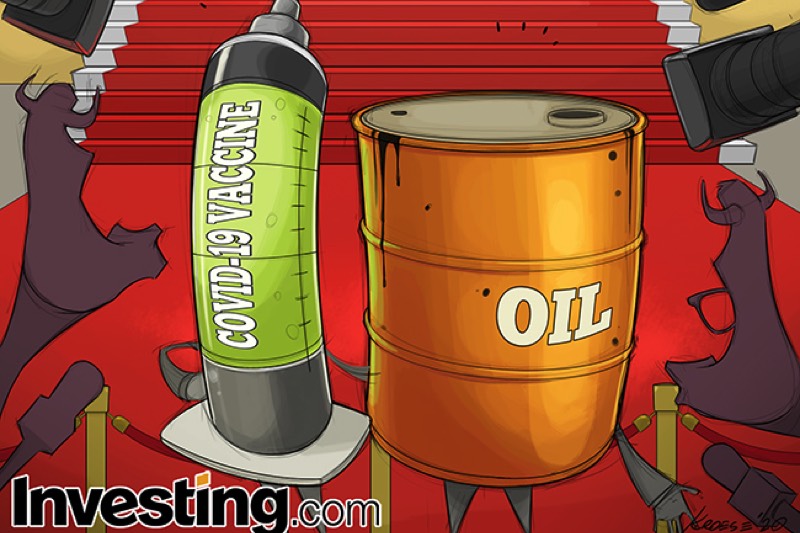By Geoffrey Smith
Investing.com -- The oil and gas industry suddenly has a lot to thank the life sciences industry for.
The announcements by first Pfizer (NYSE:PFE) and BioNTech, and then Moderna (NASDAQ:MRNA), that their vaccines against Covid-19 had been proven in trials to be both effective and safe has completely changed the outlook for the world oil market.
At least, that's what you'd think, looking at how crude prices have performed in the last two weeks. The prospect of a vigorous rebound in demand has allowed the market to 'look through' a fresh dip in consumption caused by the North American and European economies slowing down again. Varying degrees of restrictions on social gatherings and business activity have again hit mobility data and forced people back into a life of near-zero fuel consumption: France, England, Ireland and Spain have all enacted near-complete lockdowns for non-industrial sites, while California Governor Gavin Newsom said on Monday that he, too, may have to issue a new stay-at-home order to the state's 40 million inhabitants, in an effort to take the pressure of its overstretched healthcare system.
Despite this, prices have shot up by one-third from a low of barely $34 a barrel at the start of the month to over $45 a barrel in the U.S. on Tuesday, and at over $48 a barrel in Europe as of Tuesday. And yet, the rally still feels more a phenomenon of sentiment than of substance. Specifically, hedge funds, who were unwilling to take the stuff for free seven months ago, have ramped up their purchases of futures contracts, pushing the level of speculative net long positions to their highest since August, according to data from the U.S. Commodity Futures Trading Commission.
The logic is simple enough. If - as seems likely - mass inoculation begins early next year in the U.S. and Europe, then consumers will soon regain the confidence to return to 'normal' patterns of life and work - commuting to an office with thousands of others, driving to movie theaters, restaurants and stadiums, taking taxis home, flying to holiday destinations and to business meetings etc. - all the things that they have not done this year.
And yet. this logic is yet to be expressed in any of the major outlooks for the oil market published by the U.S. government, the International Energy Agency and, most importantly, the Organization of Petroleum Exporting Countries. As OPEC President Abdelmajid Attar said on Monday as he opened an eagerly-awaited meeting to review the group's output policy for the next few months: "It is clear that a global deployment of vaccines will take time, and its effect will likely begin to be significantly apparent in the second half of 2021.
Much of the rally of the last two weeks has been a reaction to signaling by Saudi Arabia and Russia, the most important members of the so-called OPEC+ bloc, that they would push back the timeframe for raising output from January (the data agreed on when they last met), by at least a couple of months. However, the surge in prices in response to the vaccine news has prompted a change of heart in Moscow, which reportedly backed a proposal from the United Arab Emirates on Monday to open the taps already in January - albeit only to the tune of 500,000 barrels a day, rather than the 1.9 million under the existing arrangements.
In all, OPEC and its allies are still holding back 7.7 million barrels a day of potential output from the market. OPEC currently only expects an increase of 6.1 million b/d in global demand next year. The outlook for prices will therefore continue to depend on the discipline of a handful of countries whose budgets have been stretched to breaking point this year.
